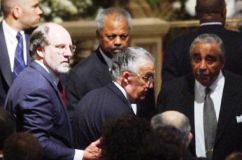US Senator Corzine wants action in Darfur
By MAX PIZARRO, The Chatham Courier
MAy 19, 2005 — Corzine and Rep. Donald Payne, D-10, spoke to the congregation of the United Methodist Church in Chatham as part of an effort by the N.J. Coalition of Religious Leaders and the N.J. Council of Churches to increase area awareness of an ongoing genocide that has already claimed the lives of thousands.

|
|
Sen. Paul Sarbanes, D-Md., center, is helped to his feet by Sen. Jon Corzine, D-N.J, left, during a funeral service for former Rep. Peter Rodino at St. Lucy’s Roman Catholic Church in Newark, N.J., Monday, May 16, 2005. Rep. Charles Rangel, D-N.Y., right, and Rep. Donald Payne, D-N.J., top center, look on. (AP). |
“The occasion of prayer, one of nurture, but one of action will unite people of faith throughout our state in calling for the Darfur Accountability Act and other bi-partisan legislation sponsored by Senator Jon Corzine and Senator Sam Brownback, R-Kansas,” according to a statement by the Chatham United Methodist Church. Payne is primary sponsor of Bill 1424 on the House side.
In northeast Africa, the Sudanese government is murdering the black Sudanese of the western province of Darfur, using Arab Janjaweed militias, the Sudanese Air Force, and organized starvation, according to the Save Darfur Coalition. “Over a million people, driven from their homes, now face death from starvation and the militias’ attempts to prevent humanitarian aid from reaching them. The Janjaweed have destroyed the people of Darfur’s villages and crops, and poisoned their water supplies, and they continue to rape, murder and terrorize.”
On Sunday, Corzine described the Janjaweed as “a roaming band of criminal thugs, lawless groups of folks.”
The Darfur Accountability Act, which Payne and Corzine both said the Bush Administration refuses to support, would create a new UN Security Council resolution with sanctions; concerted U.S. diplomacy to achieve a United Nations Security Council resolution; an extension of the current arms embargo to cover the Government of Sudan; the freezing of assets and denial of visas to those responsible for genocide, crimes and humanity, and war crimes; accelerated assistance to the African Union mission; a Presidential Envoy for Sudan; and a military non-fly zone in Darfur, according to a summary of the act provided by Corzine.
‘How Can We Stand By?’
Rev. Pastor Paul Maliel of the United Methodist Church began with a sermon targeting complacency.
“The voice of God is crying from the people,” Maliel said. “How can we stand by and look away as this is going on?”
Maliel said he worked in the Rwandan refugee camps in Zaire during the time of that genocide in the 1990s.
“I heard the cries of families who were displaced,” the pastor said. “I heard the cries of God in the Congo.”
He pleaded with the congregation to see the mission of ending genocide in Darfur as a vital part of being a true church.
“God’s holy spirit moves us to work together for the common good of all,” he said, “not simply to fight each other on the ladder toward success.
“What is happening in Darfur can happen here,” he added.
Corzine
The senator was up next.
“Good morning, Church,” Corzine said after he had ascended the altar and stood at the lectern. “It is wonderful to have the opportunity to come and speak about a subject that Congressman Payne and I are passionate about – to ask for your help.”
The senator started by emphasizing the bi-partisan nature of his work on this issue, noting that Senator Sam Brownback, R-Kansas, is championing the battle against genocide on the other side of the aisle.
“No one really knows how many have been killed in Darfur,” said the senator. “We don’t know if it’s 250,000 or 400,000. What we do know is that a great tragedy has befallen a people. It is a tragedy to see man fight man, particularly when it’s encouraged by a sovereign power.”
Corzine said he has visited the neighboring country of Chad along the border of Darfur twice in the past nine months. He returned from his latest trip to the area ten days ago, where he saw refugees in the border camps, desperate to get out of Darfur.
“There are two and a half million refugees in Darfur and Chad,” he said. “There is a great human tragedy building in those camps. Our government and our society have provided tremendous amounts of refugee aid, but the nutritional needs for the people in those camps are still not what they should be. ?Humanitarian aid and medical care needs to flow freely into those camps.”
Payne
Payne said we need to learn from the lessons of the holocaust.
“After World War II, there was the statement, ‘never again,'” said the Newark congressman. “In the months leading up to the war, we looked the other way when Jewish people were being killed. This is a situation. This is a quiet genocide, not being covered much by the press.”
Payne urged people to call Rep. Chris Smith, R-4, chairman of the House Subcommittee on Africa, Global Human Rights, and International Operations, “to mark up Bill 1424, where it is languishing.”
Citing a letter to the Government of Sudan written by U.S. Secretary of State Condoleeza Rice, which praises the Sudanese for help in the war on terror, Payne said he fears the Bush Administration is allying itself with a brutal government while downplaying the genocide.
“The war on terror has become the only issue,” said Payne. “During the Cold War, thousands and millions of people died in our quest to keep countries from communism.
“If we are going to abandon all of our principles, we are in trouble,” Payne said. “We have to decide what is principal and what we stand for, or at one point we will stand for nothing other than the so-called war on terror.”
